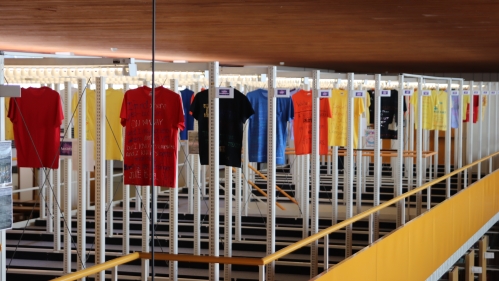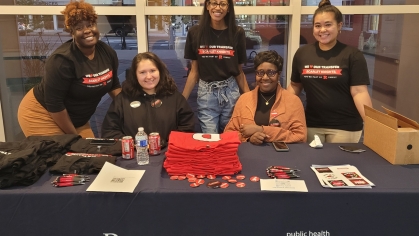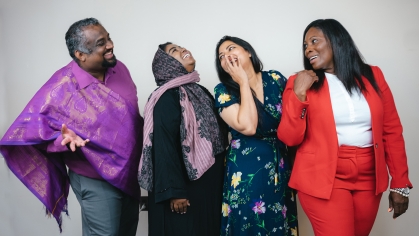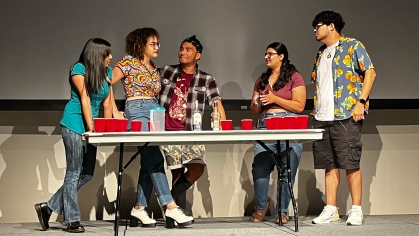Crisis Intervention Hotline Provides Crucial Support during—and after—Domestic Violence Awareness Month

October marks Domestic Violence Awareness and Prevention Month (DVAM), a month dedicated to bringing advocates and community members together to end domestic violence. At Rutgers—New Brunswick, the Office of Violence Prevention and Victim Assistance (VPVA), with campus partners, has taken a lead on providing support and programming during DVAM through their Turn the Campus Purple campaign.
Upcoming events include a Town Hall with Rutgers University Student Association (RUSA) in the Student Activities Center (SAC) 7:30 P.M. on Thursday, October 19th, as well as a Smash the Pumpkin/Patriarchy Party from 7 P.M. outside the VPVA office on 19 Bartlett Street. However, one crucial resource that will remain available throughout the rest of the month—and the entire calendar year—is VPVA’s crisis intervention hotline, which aims to help survivors cope with the effects of interpersonal violence.
This hotline, available to Rutgers students, staff, or faculty, connects callers with a trained, confidential advocate who provides them with support and information about their available options. If needed, advocates can also accompany callers to health services or police departments, help them navigate the legal system, contact faculty members or departments on their behalf, and more.
There are many reasons why callers reach out to the crisis intervention hotline, and VPVA staff and advocates emphasized the range of calls that they receive.
“We’ve seen people call the hotline for a wide array of experiences, and people who haven’t been directly involved or harmed can call the hotline—professors, staff, or friends,” said Rebecca Vazquez, director of VPVA. “For example, calls can either be for an incident that just happened or for something that happened a while back around which they’re experiencing some distress.”
VPVA professional staff and volunteer advocates staff the hotline, and both must complete sixty hours of training before they can receive live calls. In these calls, advocates talk through the caller’s situation with them, providing critical information and support.
“The hotline provides callers with a confidential, safe space for disclosure and help from someone who is supportive, respects their choices, and is capable of understanding their individual needs,” said Lynne Trabachino, an associate graduate faculty and professional research staff members who has served as an advocate since 2018. “ This service is an invaluable resource for survivors of sexual assault and domestic violence to get the help they need.’”
Lisa Smith, the Justice and Education coordinator at VPVA, echoed Trabachino’s thoughts.
“The importance of this work is hard to put into words,” she said. “A survivor will call, and they’ll say, ‘Wow. Y’all do that. You do that.’ And they’re moved to such an extent that it’s difficult for them to express how important this service is to them.”
In fact, VPVA’s hotline service is not only notable to the Rutgers community, but also in the context of other universities, which often don’t advertise similar resources.
“At universities of comparable sizes, if they do have a department like VPVA, it is very small,” said Vazquez. “We’re proud and fortunate to have a standalone office and a full staff, and to have the staffing and volunteer capacity to provide a 24-hour, seven-day-a-week service like this hotline.”
Moving forward, VPVA hopes to train more volunteers in order to spread out the work of this hotline. While calls to the hotline have spiked in recent years, the number of active volunteers has dipped since the COVID-19 pandemic. Still, the work continues, and VPVA continues to recruit and train new advocates.
Vazquez highlighted the importance of volunteer advocates to the continued work of the hotline.
“Our volunteers are incredibly special,” she said. “Think about it: they spend sixty hours training to be a person who can support someone else in what might be the worst moment of their life. That says a lot about our beloved community, and it says a lot about the people who volunteer with our program.”
Smith concurred. “We greatly appreciate our advocates, and they’re the folks who make this work possible.”
The VPVA hotline is available at 848-932-1181. Click here if you are interested in learning more about becoming an advocate for the hotline. Click here to read our profile on VPVA—and Turning the Campus Purple—from last year. To access VPVA’s website, click here.



